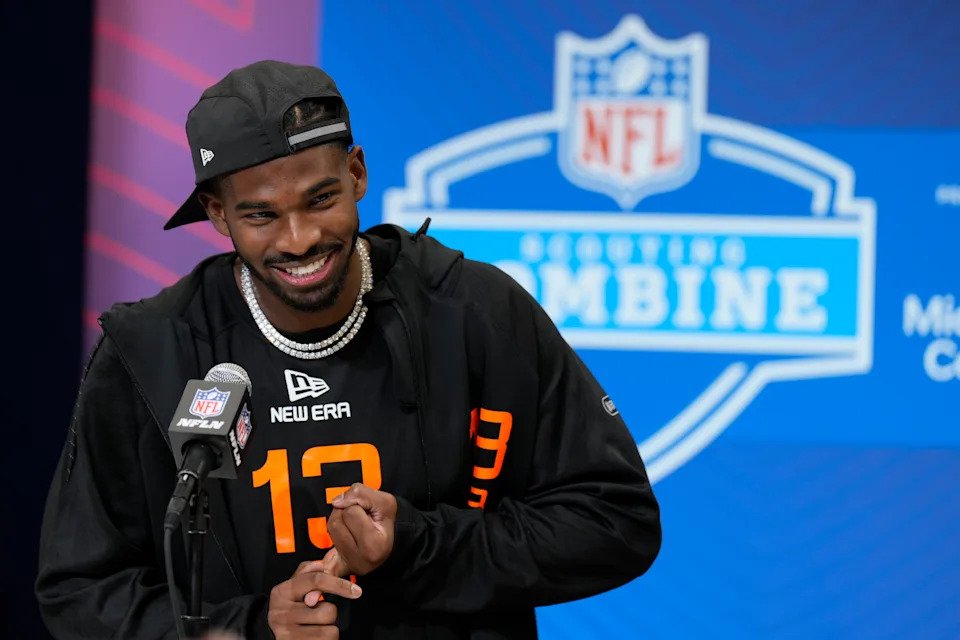A little over a year ago, when multiple major college stars declined to participate in any workout portion of the league’s annual scouting combine, an AFC general manager pointed to the growing trend as the arrival of the “opt-out” generation.
As I pulled together a story about it, I spent days listening to decision makers inside the league either grouse or contextualize it. To many, it was an example of a troubling new norm, where some NFL Draft prospects didn’t see the pre-draft process as necessary to make a successful transition into the league. To others, it was an example of players taking power into their own hands and refusing to take part in something that would likely only hurt them.
Advertisement
“Every step has been eroded over time,” one high-ranking AFC executive complained. “Guys opt out of high school games, college bowls, all-star games, combine, pro days. It’s the new normal. The arrogance of it all. And it’s only going to get worse.”
Draft app promo
An NFC executive was a little more diplomatic about it, suggesting, “Some of it is these guys not wanting to be overexposed.
But inside it all, there was a thread of common agreement. When it came to an elite talent like Marvin Harrison Jr., declining to take part in most of the pre-draft process didn’t matter. He didn’t do workouts. He didn’t speak to media. He did things the way he wanted, and he was still taken with the fourth overall pick in the draft. But also in that same thread of common agreement: Someday another player is going to do everything his way, and it’s going to bite him.
Advertisement
It was hard not to think about those conversations as I watched Colorado quarterback Shedeur Sanders tumble down the draft board all the way to the fifth round of this NFL Draft. It was an unprecedented fall that shocked even those who were deeply into the critical side of the ledger when it came to the assessment of Sanders.

Shedeur Sanders did things his way during the NFL Draft talent evaluation process. And it looks like the league responded coldly to that approach. (AP Photo/George Walker IV)
(ASSOCIATED PRESS)
One former NFL general manager — who watched Sanders during the 2023 and 2024 seasons — was a solid critic of him as a possible cornerstone quarterback at the next level. And even he was left in disbelief when Shedeur fell out of the third round.
“I’m shocked it’s this bad,” the former GM said. “I thought he was a [second- to third-round grade] in reality, but this seems personal.”
Advertisement
I reached out to that same former GM on Saturday night, with Shedeur having been selected in Round 5 by the Cleveland Browns. I asked him if he believed the fall illustrated a need for star players to reconsider the ramifications of navigating the pre-draft process without the utmost seriousness and preparation.
“It was a pretty unique situation,” he said. “Lots of things combined to create this scenario. It’s still case by case and agent by agent, I’d say.”
This is a very even-handed and fair response. And while I don’t know the ins and outs of how Sanders’ draft process went with every team, I will say this: When the NFL Network chose to publicize visceral anonymous comments from a handful of league sources about their discontent to Sanders’ approach in meetings or what they viewed as “arrogance,” I wasn’t shocked. I had also heard some extremely negative opinions about Sanders inside teams. Some dealt with his football evaluation on the field. Others were about how he carried himself. Still others were — and this can’t be ignored — rooted in Sanders’ football career having been guided at seemingly every step by his father, Deion Sanders.
For those looking for the one thing that culminated in Shedeur’s draft fall, there’s going to be disappointment because I believe it was a different cocktail for each franchise and maybe even for every single evaluator who was tasked with building a dossier on Shedeur. You can find some who thought his decision to completely check out of the combine was a massive mistake born out of him not understanding how his evaluations were really shaping up. Others point to his interviews, his preparedness to face curveballs when meeting with teams, or never having played for a head coach at a high level of football who wasn’t his father. Not having an agent to prepare him at the start of the process or then try to stop his fall at the end of the process might have been costly. Some simply pointed to football evaluations that they believed were lacking.
Advertisement
The bottom line: Teams across the league either found reasons to pass on him, or were never convinced by Sanders in the pre-draft process as to why they should take him. This, in reality, happens every year with some players. This time it happened with an extremely high-profile player who also had a good résumé of success.
A few evaluators who spoke to Yahoo Sports late Saturday night expressed an element of one common theme: the pre-draft process matters a lot when you’re an imperfect prospect or already have a deep base of critics. Doubt can be inflated when any of the steps are fumbled or skipped. You can get removed from draft boards. You can suffer a slide. And you can become the prime model of a message that teams desperately try to get across to prospects every year: You can do it your way rather than their way, but it could end up costing you.
In Shedeur Sanders’ case? For a variety of reasons that are distinctly personal to the teams that passed on him, it did.
Read the full article here














